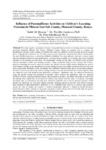| dc.description.abstract | This study sought to accentuate influence of parental home activities on learning outcomes amongst preschool learnersin Mbooni Sub County, Makueni County, Kenya. Its purpose was to examine the parentalhome activities in the learning of children.This study was guided by Social Learning theory developed by Lev Vygosky that explain the role of a more experience peer andsocial- cultural factors that are indispensable for early childhood processes to developin children’s education. The study utilized a descriptive survey design that use structured interviews and questionnaire. An observation schedule for collecting data on the learning outcomes of the children was also used. The independent variable for the study was parental home activities whereas dependent variable was learning outcomes. Target population being teachers, parents and children, purposive sampling was used to select the teachers and parents whereas simple random sampling was used to select learners.Validity of the instruments was tested during piloting in two public preschools that were not used in the actual study. Reliability of the instruments was established through testing and re-testing during piloting. The data collected was edited and coded according to themes that were derived from the research objective.Data was analyzed using both qualitativeand quantitative techniques. Qualitative data was analyzed thematically along the specific themes and presented in narrative forms whereas the quantitative data was analyzed descriptively using frequencies and percentages and presented using tables, pie charts, and graphs in order to get the findings. Key stakeholders in the education industry may benefit from the study, for example, curriculum developers may be motivated to develop more interactive materials such as books and play materials which parents can effectively use with their children and may encourage parents to put forth extra effort to become more involved in their preschooler’s education. It was established that there are no policies that explicitly outline the roles of parents and teachers to enhance partnership. Ministry of Education should develop a homework policy that is friendly to all parents irrespective of their literacy level to formally make the parents and teachers understand their roles outside the normal classroom setup | en_US |

